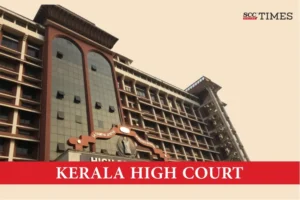Kerala High Court: In a criminal miscellaneous case filed against the order passed by Sessions Judge, wherein the Judge rejected the petition filed by the accused seeking permission to conduct cross examination of the prosecution witnesses through video conferencing citing health reasons and the counsel’s inability to travel up to Thiruvananthapuram. V.G. Arun, J. while quashing the impugned order, granted permission for cross examination of the remaining prosecution witnesses through video conferencing.
The accused contended that, Electronic Video Linkage Rules for Courts (Kerala), 2021 were intended to enable, among other things, cross-examination through video conferencing also.
The issue for consideration was whether cross-examination of witnesses present in court can be done from a remote point.
The Court took note of Rule 2 of the Electronic Video Linkage Rules for Courts (Kerala), 2021, and noted that an Advocate, who intends to examine a witness, can be permitted to be virtually present in the court room by remote communication using technology. Going by Rule 3(1), Electronic Video Linkage facilities can be used at all stages of judicial proceedings. As per sub-rule (2) of Rule 3, all proceedings conducted in a court by way of Electronic Video Linkage shall be deemed to be judicial proceedings and all the courtesies and protocols applicable to the court shall apply to the virtual proceedings.
The Court further noted that there is no provision in the Rules enabling examination of witnesses by a counsel sitting at a Remote Point. Moreover, as per Rule 6(1), only parties to the proceedings or witnesses can move application seeking conduct of the proceedings through Electronic Video Linkage. This obvious omission should not result in the denial of permission to examine witnesses by the counsel sitting at a remote point, as that would impede the accused’s right to avail the services of a counsel of his choice.
The Court highlighted that the very objective behind the introduction of the Electronic Video Linkage Rules is to make courts more accessible and the proceedings more expeditious.
The Court said that Rule 10 enables advocates to address arguments from a remote point, without the presence of the co-ordinator. If arguments can be advanced from a remote point without the co-ordinator being present, conduct of cross-examination can also be permitted, as grant of such permission will be in the interest of justice and would ensure expeditious disposal of cases, by avoiding unnecessary adjournments.
However, the Court made it clear that permission to conduct cross-examinations via video conferencing is not an automatic right. Such permission should only be granted if valid reasons are provided, and the absence of a specific provision in the rules should not prevent this. When such requests are allowed, the Court can require that the remote location be equipped with all necessary facilities, and that a competent advocate, well-versed in the facts of the case, be present in the courtroom for the full duration of the cross-examination, ensuring that the process remains fair and efficient.
The Court directed that the Registrar General to provide a copy of the judgment to the Rules Committee for consideration of whether the Electronic Video Linkage Rules for Courts (Kerala), 2021 should be amended. Specifically, the amendment would allow for the provision of permitting cross-examinations of witnesses from a remote location.
Thus, the Court set aside the impugned order.
[Alex C Joseph v. state of Kerala, 2024 SCC OnLine Ker 7541, decided on 18-12-2024]
Advocates who appeared in this case:
For Petitioner: S.Rajeev, V.Vinay, M.S.Aneer, Sarath K.P. , K.S.Kiran Krishnan, Advocates
For Respondent: Sreelal N.Warrier, SPL.Public Prosecutor, Central Bureau of Investigation (CBI)

